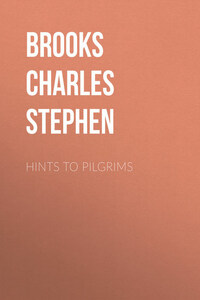WHEN a man's thoughts in older time were set on pilgrimage, his neighbors came forward with suggestions. One of them saw that his boots were freshly tapped. Another was careful that his hose were darned with honest wool – an oldish aunt, no doubt, with beeswax and thimble and glasses forward on her nose. A third sly creature fetched in an embroidered wallet to hold an extra shift, and hinted in return for a true nail from the holy cross. If he were a bachelor, a tender garter was offered him by a lonely maiden of the village, and was acknowledged beneath the moon. But the older folk who had made the pilgrimage took the settle and fell to argument on the merit of the inns. They scrawled maps for his guidance on the hearth, and told him the sights that must not be missed. Here he must veer off for a holy well. Here he must beware a treacherous bog. Here he must ascend a steeple for the view. They cautioned him to keep upon the highway. Was it not Christian, they urged, who was lost in By-path Meadow? Again they talked of thieves and warned him to lay a chair against the door. Then a honey syllabub was drunk in clinking cups, and they made a night of it.
Or perhaps our pilgrim belonged to a guild which – by an agreeable precedent – voted that its members walk with him to the city's gate and present from each a half-penny to support him on the journey. The greasy pockets yield their treasure. He rattles on both sides with generous copper. Here, also, is a salve for man and beast – a receipt for a fever-draught. We may fancy now the pilgrim's mule plowing up the lazy dust at the turn of the road as he waves his last farewell. His thoughts already have leaped the valley to the misty country beyond the hills.
And now above his dusty road the sun climbs the exultant noon. It whips its flaming chariot to the west. On the rim of twilight, like a traveler who departs, it throws a golden offering to the world.
But there are pilgrims in these later days, also, – strangers to our own fair city, script in wallet and staff in hand, – who come to place their heavy tribute on our shrine. And to them I offer these few suggestions.
The double stars of importance – as in Baedeker – mark our restaurants and theatres. Dear pilgrim, put money in thy purse! Persuade your guild to advance you to a penny! They mark the bridges, the shipping, the sharp canyons of the lower city, the parks – limousines where silk and lace play nurse to lap dogs – Bufo on an airing, the precious spitz upon a scarlet cushion. They mark the parade of wealth, the shops and glitter of Fifth Avenue on a winter afternoon. "If this is Fifth Avenue," – as I heard a dazzled stranger comment lately on a bus-top, – "my God! what must First Avenue be like!"
And then there are the electric signs – the mammoth kitten rolling its ball of silk, ginger-ale that forever issues from a bottle, a fiery motor with a flame of dust, the Wrigley triplets correcting their sluggish livers by exercise alongside the Astor roof. Surely letters despatched home to Kalamazoo deal excitedly with these flashing portents. And of the railroad stations and the Woolworth Tower with its gothic pinnacles questing into heaven, what pilgrim words are adequate! Here, certainly, Kalamazoo is baffled and must halt and bite its pen.
Nor can the hotels be described – toppling structures that run up to thirty stories – at night a clatter in the basement and a clatter on the roof – sons of Belial and rich folk from Akron who are spending the profit on a few thousand hot-water bottles and inner tubes – what mad pursuit! what pipes and timbrels! what wild ecstasy! Do we set a noisy bard upon our towers in the hope that our merriment will sound to Mars? Do we persuade them that jazz is the music of the spheres? But at morning in these hotels are thirty stories of snoring bipeds – exhausted trousers across the bed-post, frocks that have been rumpled in the hubbub – tier on tier of bipeds, with sleepy curtains drawn against the light. Boniface, in the olden time, sunning himself beneath his bush and swinging dragon, watching the dust for travelers, how would he be amazed at the advancement of the inn! Dear pilgrim, you must sag and clink for entrance to the temples of our joyous gods. Put money in thy purse and wire ahead!
On these streets there is a roar of traffic that Babylon never heard. Nineveh in its golden age could have packed itself with all its splendid luggage in a single building. Athens could have mustered in a street. Our block-parties that are now the fashion – neighborhood affairs in fancy costumes, with a hot trombone, and banners stretched from house to house – produce as great an uproar as ever arose upon the Acropolis. And lately, when our troops returned from overseas and marched beneath our plaster arches, Rome itself could not have matched the largeness of our triumph. Here, also, men have climbed up to walls and battlements – but to what far dizzier heights! – to towers and windows, and to chimney-tops, to see great Pompey pass the streets.








